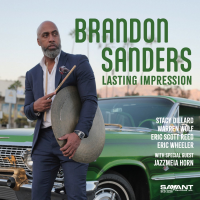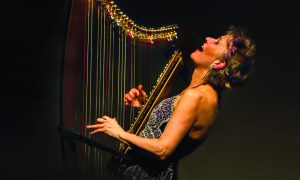
From his earliest recordings, Gary always had a marvelous sense of swing and sensitivity--without overplaying. His cool, four-mallet approach to the vibes added a youthful feel to many of the albums on which he appeared, and as the decade progressed, his sound grew increasingly progressive rather than hinged to vibists of the past.
In Part 1 of my four-part interview with Gary, 67, the vibraphonist and jazz-rock fusion pioneer talks about growing up in Indiana, meeting Boots Randolph, teaming up with Hank Garland and Chet Atkins, traveling to the 1960 Newport Jazz Festival, landing an RCA record contract at age 17, and then starting college in Boston:
JazzWax: How did you wind up playing the vibes?
Gary Burton: I was born in Anderson, IN. My brother and sister were musical, and my father played piano. All of the kids in my family wanted to take music lessons. My older sister started taking piano lessons at age 6. I hovered over her and started messing around on the piano as soon as she started playing. When I was six, my father decided it was time for me to play an instrument. There was a lady in the area who played the marimba and vibraphone. He took me there, and soon my parents bought me a student marimba. Then they bought me full-sized set of vibes and marimba. My father built a platform so I could reach the keys.
JW: How long did you take lessons?
GB: For two years. Then we moved to Princeton, IN, which was an even smaller town. I didn't have a teacher there, but I had already mastered the basics. My father would buy me sheet music to play.
JW: Did you play vibes in school?
GB: No. There was no place for a mallet instrument there. Instead, I played the snare drum. At first I didn't know much about jazz. I was playing everything from light classical to written-out solo pieces. Then at age 12, I stumbled onto a jazz record. It was a 10-inch LP of the Benny Goodman Sextet in 1954.
JW: Do you remember the name of the song that impressed you most?
GB: After You've Gone. It was taken at a fast tempo, which knocked me out. I was already chewing at the edges of improvisation. I had already been making up introductions, re-voicing chords, and fleshing out songs. The improvisers on the Benny Goodman record were doing the same thing only much more extensively. I then began buying jazz records to get the feel for swing.
JW: How were you able to figure out if you were on the right track without a teacher?
GB: With my tape recorder. My father had bought me one at the time I started playing. It was a reel-to-reel. I discovered that if you hear what you're playing, you automatically make all kinds of adjustments in the feel, pace and rhythmic interpretation of what you're doing. Your unconscious mind winds up making all the decisions. In jazz, you can't think about what you're doing. Your unconscious mind has to handle all that data at a remarkable speed.
JW: What exactly did you do with the tape recorder?
GB: I had a strong habit of practicing and playing with my tape recorder. I used it as my band. I'd comp on the piano with the metronome clicking to keep time. Then I'd play back the tape and practice my vibes along with the recording. When I'd play a local gig, I'd take the 50-pound recorder along. I'd just reuse the blank tapes.
JW: Where did you buy your records in such a small town?
GB: The nearest record store was an hour away in Evansville, where I eventually took lessons. Every Saturday, my father would drive me there and I would have my lesson and peruse the record store on the street level. I would flip through LPs by Art Blakey and the Jazz Messengers, Horace Silver, Dave Brubeck, early Charles Mingus, and blues and roots records.JW: Did you eventually have a musical breakthrough?
GB: My first big epiphany came in 1958, when I attended a jazz band camp at Indiana University. It was the Stan Kenton Band Clinic and was only a few hours from where I lived. My father dropped me off. It was the summer of 1959 was 16 years old. It was amazing. There were about 150 kids at the camp who were as excited about jazz as I was.
JW: Who was on staff?
GB: Shelly Manne was the drum teacher. Kenton's musicians were all there. I was in John LaPorta's [pictured] band as the pianist. That band got invited to go to French Lick, IND., where George Wein was putting on a jazz festival.
JW: Pretty exciting?
GB: There I was, playing the opening act with a student big band and Miles Davis' Kind of Blue sextet backstage. At the time, I didn't get what Miles' group was playing. It didn't sound polished to me. Miles sounded like an out-of-tune trumpet player. A year later I heard the band on record and said to myself, “Wow, how could I not get it?"
JW: Did you play professionally in high school?
GB: In my senior year, I landed a job in Evansville, where I played in a restaurant five days a week--piano and vibes. I found a pianist to teach me harmony. I also was hearing all the stuff on records.
JW: What did you do after graduating from high school?
GB: I had applied and was admitted to Berklee School of Music in Boston. I was due to start in the fall so I had the summer off. But right after graduation I moved to Nashville because of saxophonist Boots Randolph [pictured].
JW: Why?
GB: Boots lived in Evansville, where his wife was from. Evansville was about 2 1/2 hours north of Nashville. Boots had heard me play. His friend, guitarist Hank Garland, had talked Columbia into making a jazz record. So Hank began looking for a vibes player. There were no vibes in Nashville [laughs]. Hank asked Boots, and Boots said, “There's this kid in Indiana who's great."
JW: What happened?
GB: Not long afterward I was riding down to Nashville with Boots [pictured] in his Cadillac convertible with my vibes in the back. Hank brought in the bassist and drummer. When we got together, we played a couple of tunes. After the audition, Hank said, “What are your plans?"
JW: What did you tell him?
GB: I told him that I was going to music school in Boston in the fall. Hank said, “Fine, but why don't you move to Nashville for the summer, and we'll play at clubs on the weekend and make this record for Columbia?"
JW: What did you do?
GB: I moved to Nashville. Hank helped me find an apartment, and we played the Carousel Club. In June, George Wein [pictured] happened to pass through Nashville looking for potential sponsors for his Newport Jazz Festival. He came into the Carousel Club, heard us play and liked it. We had a trio at that point--vibes, bass and guitar. George suggested that Hank put together a band and appear at the upcoming Newport festival in early July.
JW: Who did Hank hire for the band?
GB: We got guitarist Chet Atkins and other Nashville musicians. Chet was a big fan of our trio. With his RCA connections, he had some money available for travel. Hank brought in Floyd Cramer on piano, Brenton Banks on violin and other top Nashville guys. We called ourselves the Nashville All-Stars. We flew to Newport. When we arrived, we checked into our bed and breakfast. But when we walked over to the concert grounds, a riot was going on. When police saw us, we told them we weren't part of the crowd rioting, that we were from Nashville. They could see we were telling the truth.
JW: What did they do?
GB: They said, “Go back to where you're staying," so we did. The next day our concert was canceled because of the violence and damage. RCA was there with remote recording equipment because the label was contracted by George Wein to record the festival. Someone had the idea to record us in front of this rambling house that RCA had rented. So we set up our instruments out on the lawn, invited all the neighbors and the people who were still stuck in town. There must have been 60 people on the grass.
JW: Why didn't you record indoors?
GB: If we had set up in the living room, there wouldn't have been room for an audience. RCA was there to do an outdoor festival anyway and wanted a live feel. But they messed up. The engineer didn't mix the tape well. I was disappointed with the final result. They had turned it over to an engineer who didn't make much of an effort to enhance the quality of the sound. The musical part is uneven as well. [Photo of the Newport, RI, riot in 1960 for Life]
JW: What did you do after Newport?
GB: I went back to Nashville with Hank. We made Jazz Winds there. By the end of the summer, I was ready to move to Boston to attend college. Weeks before I left, Chet Atkins called me into his office and told me he had talked to RCA and that the label wanted to offer me a contract.
JW: How did you feel?
GB: At age 17, I was overwhelmed. They handed me a 15-page contract to look over, and I took it back home with me to Indiana. My father and I tried to figure out the legal language but gave up. The contract sat there for a week or two on the kitchen table. I wasn't sure how to respond. Then one day, another contract arrived in the mail with better terms. RCA wanted me and had assumed I was stalling. They had decided to sweeten the deal. One of the extras they offered me turned out to be quite important.
JW: Which one?
GB: RCA had agreed to subsidize my college living expenses. So I'd receive a $25 check each week, which would cover rent and food. I headed off to Boston with a record contract. It called for me to make one record a year while in school. Then when I finished and started my career, I'd record two albums a year. I was the only freshman at the Berklee College of Music with a record deal [laughs].
Tomorrow, Gary talks about recording for the first time as a leader, leaving college, joining the George Shearing Quintet and what he learned from the experience.
JazzWax tracks: Gary Burton's recording for RCA at Newport is called After the Riot at Newport. It's out of print but available here. Jazz Winds can be found as a download or CD on Move! The Guitar Artistry of Hank Garland here, which combines Jazz Winds and Subtle Swing.
JazzWax clip: Here's a taste of Gary with Hank Garland playing All the Things You Are, with Joe Benjamin (b) and Joe Morello (d)...
This story appears courtesy of JazzWax by Marc Myers.
Copyright © 2026. All rights reserved.


























